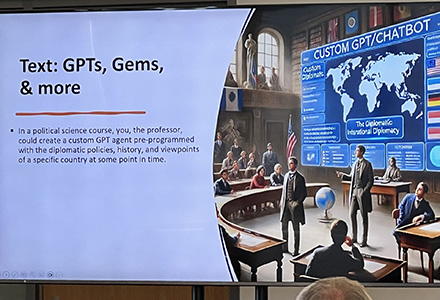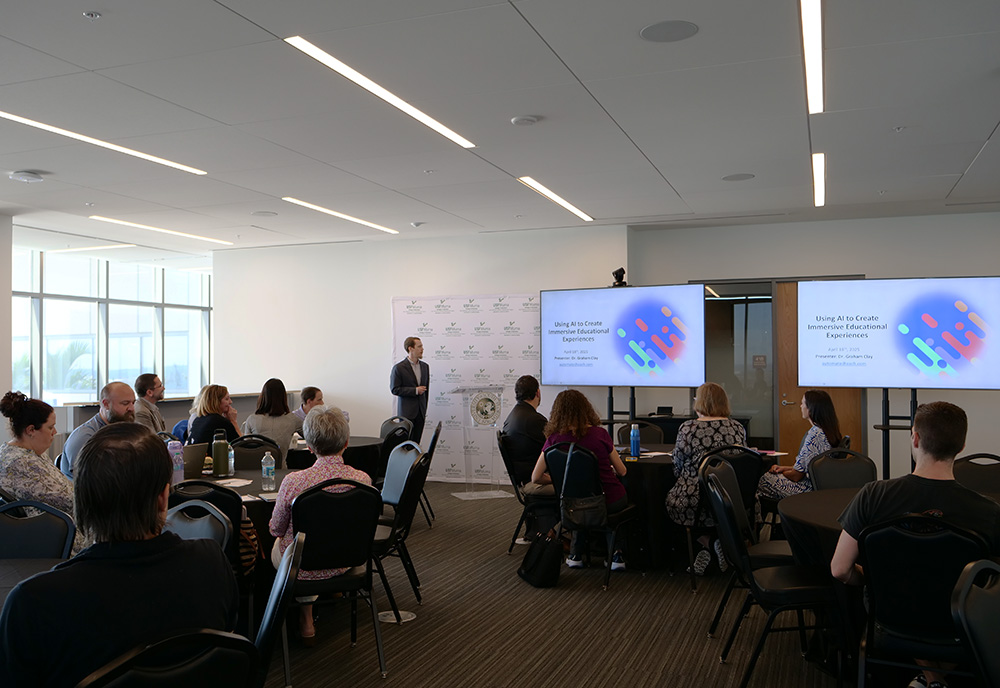By Sarah Sell, University Communications and Marketing
Picture a world where students are using Artificial Intelligence (AI) to master the art of negotiation. From closing business deals to engaging in diplomatic dialogue with global leaders, this vision is quickly becoming a reality in 21st-century classrooms.
To support this shift, USF is helping educators build the skills they need in using AI-driven technology to enhance experiential learning in their daily instruction.
Throughout the 2024–2025 academic year, faculty, staff and administrators have been participating in a series of discussions and workshops focused on identifying the most effective techniques and strategies for enriching student engagement and success. A key part is learning how to safely and effectively use AI in the classroom.
"While new technology and AI are part of these conversations, they are primarily viewed as tools to support and advance good pedagogical practices," said Catherine Wilkins, associate dean of the Judy Genshaft Honors College on the St. Petersburg campus.
Wilkins co-leads one of USF's Faculty Learning Communities supported by the Center for Innovative Teaching and Learning (CITL). Members spend the year reading, researching, discussing and exploring solutions to an important issue in their community.

The faculty workshop gave examples of how AI can be used to simulate negotiations such as a meeting with world leaders.
The group recently invited philosopher Graham Clay, an expert in the philosophical and pedagogical applications of AI and instructor at the University of North Carolina at Chapel Hill, to lead two workshops on the St. Petersburg campus.
The first, "Effectively Leveraging AI for Productivity," brought USF leadership and members of the St. Petersburg Downtown Partnership together to discuss the transformative use of AI in business, touching on efficiency, labor and ethics. The second, "Using AI to Create Immersive Educational Experiences," was developed specifically for instructional faculty.
The afternoon workshop demonstrated how AI can support experiential learning that educators aim to implement in their classrooms. Clay showed how AI isn't just a trendy tool but can help make educational practices more engaging and effective.
For example, tools like ChatGPT, Claude or Gemini could build a mock business, simulate customer interactions, practice negotiations, solve problems or experiment with marketing strategies.
"When students are starting out, they have anxiety. They don't know what to do and are afraid of speaking up in class," Clay said. "With AI, students can be in their dorm room or home and have a negotiation partner who they don't feel judged by."
Graham added that the AI-driven practice can help build confidence. But he recognized a growing concern among educators with students’ use of AI.
"With real-world experience, you have restraint, judgment and wisdom. But the modern student wants to do things easily. They are tempted not to learn the fundamentals and instead just let AI give them the content," Clay said.
The workshop stressed how AI can help complete tasks, but students still need to build a strong understanding of a subject and get hands-on experience in their chosen field of study.
"We're trying to make sure that we're using AI in a way that is safe, creative and enhances the learning experiences for students," said Caylen Holmes, an instructional designer for USF's Innovative Education who attended the workshop and works with faculty to design courses for online learning.
For the field of education, AI is here to stay. USF’s commitment to properly using AI is highlighted by the recent creation of the Bellini College of Artificial Intelligence, Cybersecurity and Computing. It's the first of its kind in Florida and one of the pioneers in the nation to bring together the disciplines of AI, cybersecurity and computing into a dedicated college.
"We have the new college, which says that AI is not going anywhere, so we need to know how to use it more dynamically and effectively in digital learning," Holmes said.
